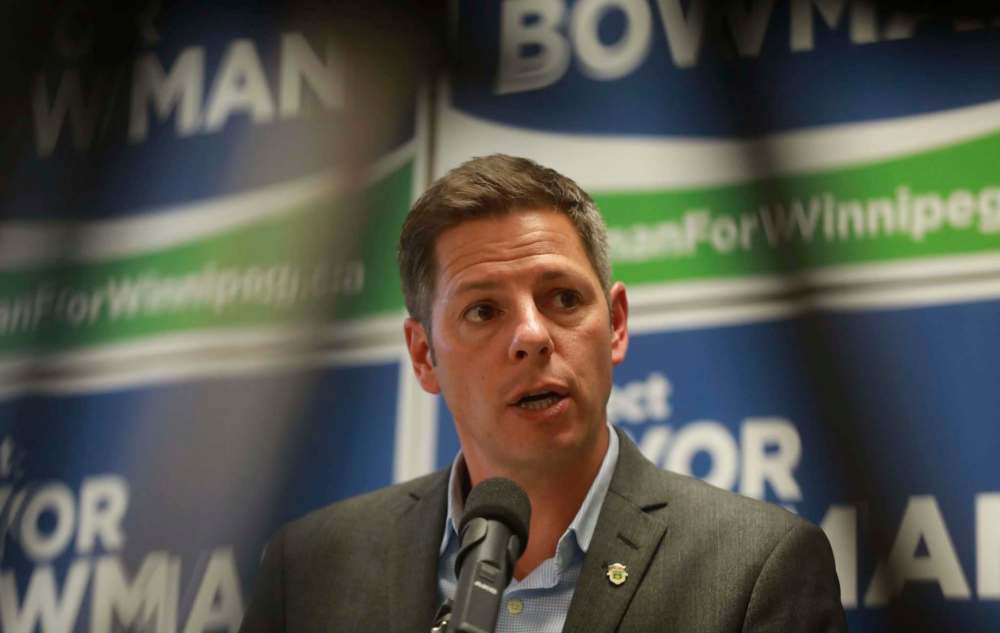Bowman promises to stay course on property tax
Advertisement
Read this article for free:
or
Already have an account? Log in here »
To continue reading, please subscribe:
Monthly Digital Subscription
$0 for the first 4 weeks*
- Enjoy unlimited reading on winnipegfreepress.com
- Read the E-Edition, our digital replica newspaper
- Access News Break, our award-winning app
- Play interactive puzzles
*No charge for 4 weeks then price increases to the regular rate of $19.00 plus GST every four weeks. Offer available to new and qualified returning subscribers only. Cancel any time.
Monthly Digital Subscription
$4.75/week*
- Enjoy unlimited reading on winnipegfreepress.com
- Read the E-Edition, our digital replica newspaper
- Access News Break, our award-winning app
- Play interactive puzzles
*Billed as $19 plus GST every four weeks. Cancel any time.
To continue reading, please subscribe:
Add Free Press access to your Brandon Sun subscription for only an additional
$1 for the first 4 weeks*
*Your next subscription payment will increase by $1.00 and you will be charged $16.99 plus GST for four weeks. After four weeks, your payment will increase to $23.99 plus GST every four weeks.
Read unlimited articles for free today:
or
Already have an account? Log in here »
Hey there, time traveller!
This article was published 14/09/2018 (2651 days ago), so information in it may no longer be current.
Brian Bowman promised to cap annual property tax increases to 2.33 per cent and to freeze water and sewer rates and the frontage levy for the next four years if voters return him as mayor.
With only 39 days before voters cast their ballots Oct. 24, Bowman’s financial statements were his first promises in the 2018 election campaign.
But they came with a large caveat: it’s the status quo, as long as the provincial government doesn’t cut funding to Winnipeg city hall any further than it already has.

“We can’t envision if there will be real cuts to (the province’s support),” Bowman said Friday from his campaign headquarters, an office space at the intersection of Notre Dame Avenue and McPhillips Street. “That is a risk that we need to be transparent and honest with Winnipeggers… but it’s certainly not something that we will plan for later.”
Bowman said the 2.33 per cent property tax increase will continue to be devoted to maintaining streets and expanding the rapid transit network.
In a break with senior administrators and council’s finance chairman, Coun. Scott Gillingham, Bowman said it’s time city council started spending impact fee revenue on new capital projects.
Acknowledging other city infrastructure – recreational and leisure facilities – are deteriorating, Bowman said taxpayers shouldn’t have to pay to maintain existing buildings while building new ones at the same time.
The city has collected $11 million from the impact fee – which is a charge on new residential development in the suburban fringes – but the money has been put into a reserve account, pending the outcome of a legal challenge from the homebuilding industry.
Bowman said he doesn’t believe council needs to wait for the outcome of the court challenge before spending the funds – a position opposed by Gillingham and senior administration.
“I don’t feel we need to wait to get permission from one interest group to use tools that council has decided are available,” Bowman said.
“Anybody can initiate a lawsuit. I don’t think that should tie the hands of council. The advice (council has) received is that the case is very weak.”
Another campaign promise made Friday was to ensure council approves a balanced budget each year for the next four years — something every council has done since Winnipeg was incorporated (city hall is required by legislation to only pass balanced budgets).

The impact fee was approved by council in October 2016, after a stormy debate between city hall and the new-home construction industry, and went into effect in certain areas May 1, 2017.
The fee is supposed to offset city costs associated with services required as a result of new development, including recreational and leisure facilities, transit and other infrastructure.
The Urban Development Institute and the Manitoba Home Builders’ Association filed a legal challenge in January 2017, on the grounds the City of Winnipeg doesn’t have the legal authority to impose the fee and the industry already pays for growth-related infrastructure.
Affidavits in support of the legal action were filed in December 2017. The case remains before the courts.
Similar charges for other types of development — industrial, commercial, office and institutional space — are supposed to come into effect in those same suburban areas no sooner than November, followed by charges for all development in all areas of the city by November 2019.
aldo.santin@freepress.mb.ca

